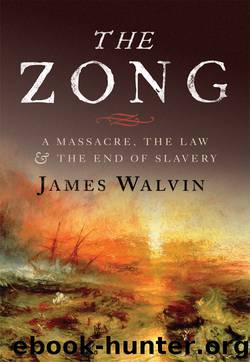The Zong by James Walvin

Author:James Walvin
Language: eng
Format: epub
ISBN: 9780300180756
Publisher: Yale University Press
In all this, those seeking freedom found encouragement and support among black friends who were already free and who were conscious of the social and legal possibilities for freedom in England.18
Apprehensive slaveholders, conscious of the risks of losing their slaves there, were especially keen to take them back to the colonies. The most effective way of doing this was brutally simple: to have the unfortunate African spirited out of the public gaze, and manhandled on to a vessel bound for the Americas. But those who tried this in London now faced the considerable obstacle of Granville Sharp himself. Following Strong's case in 1765 Sharp had established a reputation as the defender of Africans threatened in this way. Desperate African victims knew that their best, often their last, hope lay with him – if only they could get word to him in time. News of the latest kidnapping of an African sent Sharp scurrying to the courts, often in a breathless effort to secure the African's freedom.19 Not all rescue attempts succeeded.
Sharp's reputation among British black people went far beyond such fraught, last-minute struggles, and he became a major source of advice and help in times of trouble. Time and again, distressed Africans found their way to Sharp's door. He briefed Africans about their legal rights, secured damages for them in court, attended their cases, and drafted reports on what had transpired in court.20 Sharp's biographer, Prince Hoare, noted that ‘His mind was now fully awakened to the magnitude of the abuses which existed with respect to African slaves in this country.’21 Throughout the 1760s and 1770s, Sharp pestered and lobbied the good and the great about the issue of slavery, firing off letters and publications, and hoping all the while to raise the awareness of those around him about what he viewed as a national disgrace. Above all, Sharp was a devout man and was convinced that the disgrace of slavery was bound to provoke the wrath of the Almighty.
Granville Sharp wanted to secure much more than the freedom of each African he helped: he sought a declaration of a general principle, a legal denunciation by the Lord Chief Justice of the whole system of slavery in England. Lord Mansfield on the other hand was equally determined not to be drawn into so far-reaching and contentious a judgment. Both men – the meticulous and ever-cautious Lord Mansfield and the impassioned, fractious and irritated Sharp – regularly locked horns on this question of fundamental legal and social importance.
Sharp had been involved in a succession of nine such kidnapping cases before the ideal case came his way in 1772. A petition arrived at Mansfield's chambers requesting a writ of habeas corpus on behalf of James Somerset, a former slave now threatened with forcible repatriation to Jamaica. It was a familiar story.
James Somerset had been enslaved in Africa and shipped to Virginia in 1749. There he was bought by a local planter, Charles Stewart, and worked for him for twenty years. Master and slave had lived for four years in Massachusetts before sailing to England in 1769.
Download
This site does not store any files on its server. We only index and link to content provided by other sites. Please contact the content providers to delete copyright contents if any and email us, we'll remove relevant links or contents immediately.
| Africa | Americas |
| Arctic & Antarctica | Asia |
| Australia & Oceania | Europe |
| Middle East | Russia |
| United States | World |
| Ancient Civilizations | Military |
| Historical Study & Educational Resources |
Room 212 by Kate Stewart(5123)
The Crown by Robert Lacey(4817)
Endurance: Shackleton's Incredible Voyage by Alfred Lansing(4783)
The Iron Duke by The Iron Duke(4356)
The Rape of Nanking by Iris Chang(4213)
Joan of Arc by Mary Gordon(4113)
Killing England by Bill O'Reilly(4004)
Say Nothing by Patrick Radden Keefe(3987)
I'll Give You the Sun by Jandy Nelson(3448)
Shadow of Night by Deborah Harkness(3368)
Hitler's Monsters by Eric Kurlander(3343)
Mary, Queen of Scots, and the Murder of Lord Darnley by Alison Weir(3210)
Blood and Sand by Alex Von Tunzelmann(3205)
Eleanor & Park by Rainbow Rowell(3176)
Darkest Hour by Anthony McCarten(3133)
Margaret Thatcher: The Autobiography by Thatcher Margaret(3082)
Book of Life by Deborah Harkness(2939)
Red Famine: Stalin's War on Ukraine by Anne Applebaum(2934)
The One Memory of Flora Banks by Emily Barr(2863)
